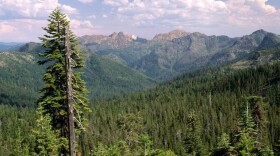
April Ehrlich
Oregon Public BroadcastingApril Ehrlich is JPR content partner at Oregon Public Broadcasting. Prior to joining OPB, she was a regional reporter at Jefferson Public Radio where she won a National Edward R. Murrow Award for her reporting on the impacts of wildfires on marginalized groups. Her reporting comes to JPR through the Northwest News Network, a collaboration between public media organizations in Oregon and Washington.
-
Oregon’s environmental agency appears to have known for months that people’s personal information was leaked.
-
The U.S. House voted 395-4 to renew funding that helps rural counties pay for schools, roads and public safety.
-
The Northwest Forest Plan has long protected vulnerable species like spotted owls in federal forests along the West Coast.
-
The Fix Our Forests Act passed out of a Senate committee Tuesday, and now heads to a full vote
-
Winery and vineyard owners accused the electricity provider of negligence over the 2020 Labor Day weekend wildfires.
-
The U.S. Forest Service plans to auction off trees in the Deschutes, Wallowa-Whitman and Umatilla national forests by the end of the month.
-
The U.S. Forest Service could close its Pacific Northwest headquarters in Portland, which oversees Oregon and Washington national forests, as part of restructuring plan.
-
One Oregon woman's journey from the loss of the Labor Day fires, through five years of dislocation, to a new beginning for her and her family.
-
A budget crisis a century in the making is coming to a head as Oregon’s rural counties wait on Congress to approve funding they’ve long relied on.
-
People have until Monday to comment on a Trump administration proposal to drastically limit public input on logging in Oregon and California.
-
The Board of Forestry has long had the power to hire and fire the state forester. Then lawmakers passed a bill transferring that authority to the governor.
-
The proposed budget bill would increase logging on federal lands, but most of that money won't go to Oregon counties that typically receive a portion of timber sales.













